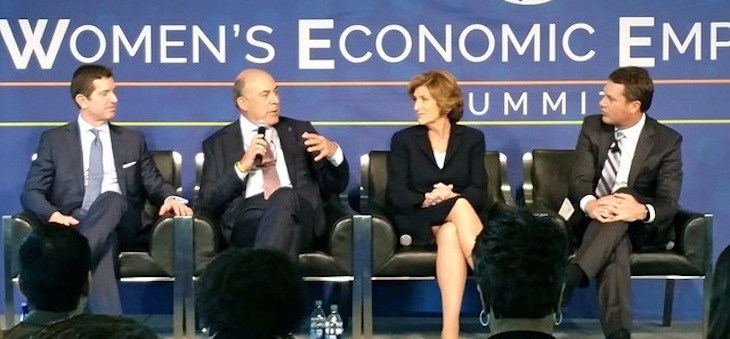Wal-Mart reinforces commitment to women-owned businesses with nine-company data gathering effort
by March 30, 2017 12:41 pm 789 views

Wal-Mart CEO Doug McMillon is joined on stage at the Women’s Empowerment Summit held Wednesday in Washington D.C. In the photo are (left to right) Alex Gorsky, CEO of Johnson & Johnson; Muhtar Kent, CEO of Coca Cola; Denise Morrison, CEO of Campbell Soup; and McMillon. (The photo is from McMillon’s Facebook page.)
Over the past five years Wal-Mart Stores achieved its goal to buy $20 billion in goods and services from women-owned businesses in the U.S., according to the retailer. However, the retailer said it fell short of its goal to double the amount of products sourced from businesses owned by women outside the U.S.
The retail giant has found a gender gap on a global scale, particularly in countries like China which is the source for many products. Just 2% of Wal-Mart’s global purchases come from women-owned businesses which is whey the retailer says it continues to invest time and money to equal the playing field.
Wednesday (March 29) at the Women’s Economic Empowerment Summit in Washington, D.C., the retail giant announced it is one of nine corporations in an effort to track and report sourcing from self-identified and certified women-owned businesses (WOBs) over the next five years.
The report will be comprised by Women’s Business Enterprise National Council (WBENC) and based on industry data. Wal-Mart said this is the first time a public report has been attempted. The retailer said it worked to get a eight of its largest suppliers involved to create a more visible movement and raise awareness for the importance of sourcing from women-owned businesses. The nine company collaboration includes Wal-Mart, Campbell Soup, Coca-Cola, ExxonMobil, General Mills, Johnson & Johnson, Mondelez, PepsiCo and Procter & Gamble.
The companies plan to report their progress each year to the WBENC who will validate the companies that are owned or operated by women, given that government agencies and the private sector run programs to promote women-owned businesses. The council will use the data to produce an annual report.
“Creating economic opportunity and growth is central to who we are as a company,” said Doug McMillon, president and CEO of Wal-Mart Stores, who attended Wednesday’s Summit. “We are proud to be part of this important initiative, and together we can make an even bigger impact in elevating these successful women-owned businesses. Our customers care where products are sourced, and we believe supporting women-owned businesses helps us put innovative products on our shelves while helping these businesses thrive and grow.”
McMillon posted on his social media site Thursday that his favorite quote from the Summit came from Denise Morrison, CEO of Campbell Soup Company who said, “Declare who you want to be, because you will need people to help you get there.”
INTERNATIONAL DIFFICULTIES
The new initiative is needed because Wal-Mart has found it underestimated the challenges women entrepreneurs face in some countries, according to Kathleen McLaughlin, president of the Walmart Foundation, who also attended the Summit. She said Wal-Mart has been able to double the amount spent to source goods from women-owned businesses in Mexico, but that’s not the case elsewhere.
“In China, for example, it’s taken us years just to identify the women-led businesses because there was no private or government data to help with the research,” she said. “In Japan, women haven’t traditionally been encouraged to start businesses, so we had to begin with pitch contests there to inspire women to participate.”
She said Wal-Mart understands the difficulties of creating a lasting change in some cultures which is why it’s intensifying the effort to support women business leaders by asking its large, male-led suppliers to report on the gender makeup of employees on their key, internal teams. She hopes other companies will join the effort of Wal-Mart and the eight other companies.
BETTER MARGINS
“Supporting women-owned businesses and diversity across our suppliers is central to who we are at PepsiCo,” said Indra Nooyi, chairman and CEO of PepsiCo. “Our commitment to diversity is not only a source of pride, it is a source of strength. And it’s part of our broader commitment to what we call Performance with Purpose, our approach to building a healthier, sustainable future for all our stakeholders – from our suppliers to our shareholders to our consumers, customers, employees, and the communities we serve.”
McLaughlin said Wal-Mart has learned that promoting women-owned businesses is also a sound financial strategy.
“We’ve found that products from women-led companies have better sell-through rates and better margins,” McLaughlin said.
She believes women entrepreneurs do well in part because they tend to get involved in businesses while making use of their own personal experiences. She said Wal-Mart buys products and services from more than 1,500 women-led businesses around the world. The retailer has also given out $134 million in grants for training 1 million women in and outside of its global supply chain.
